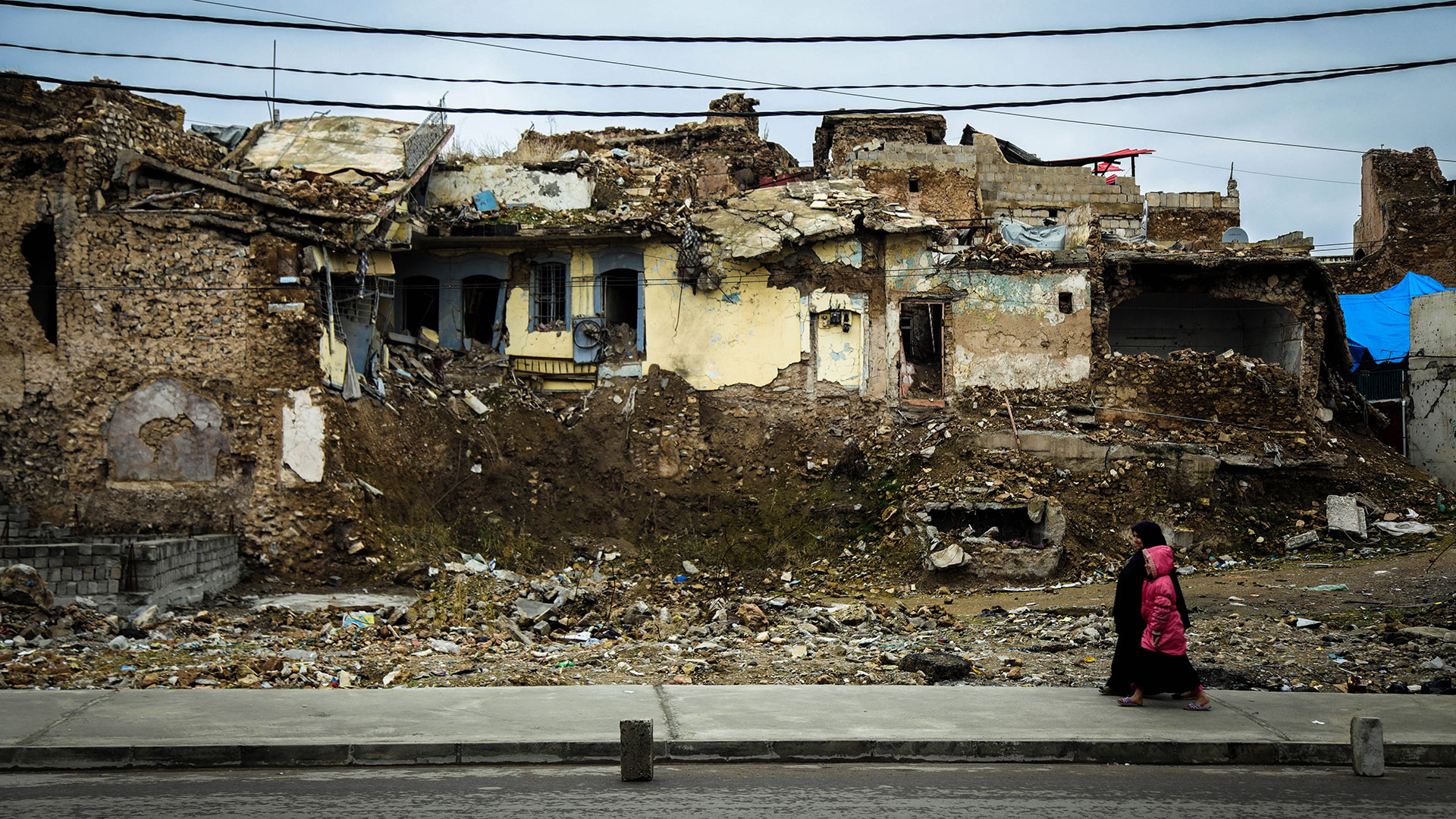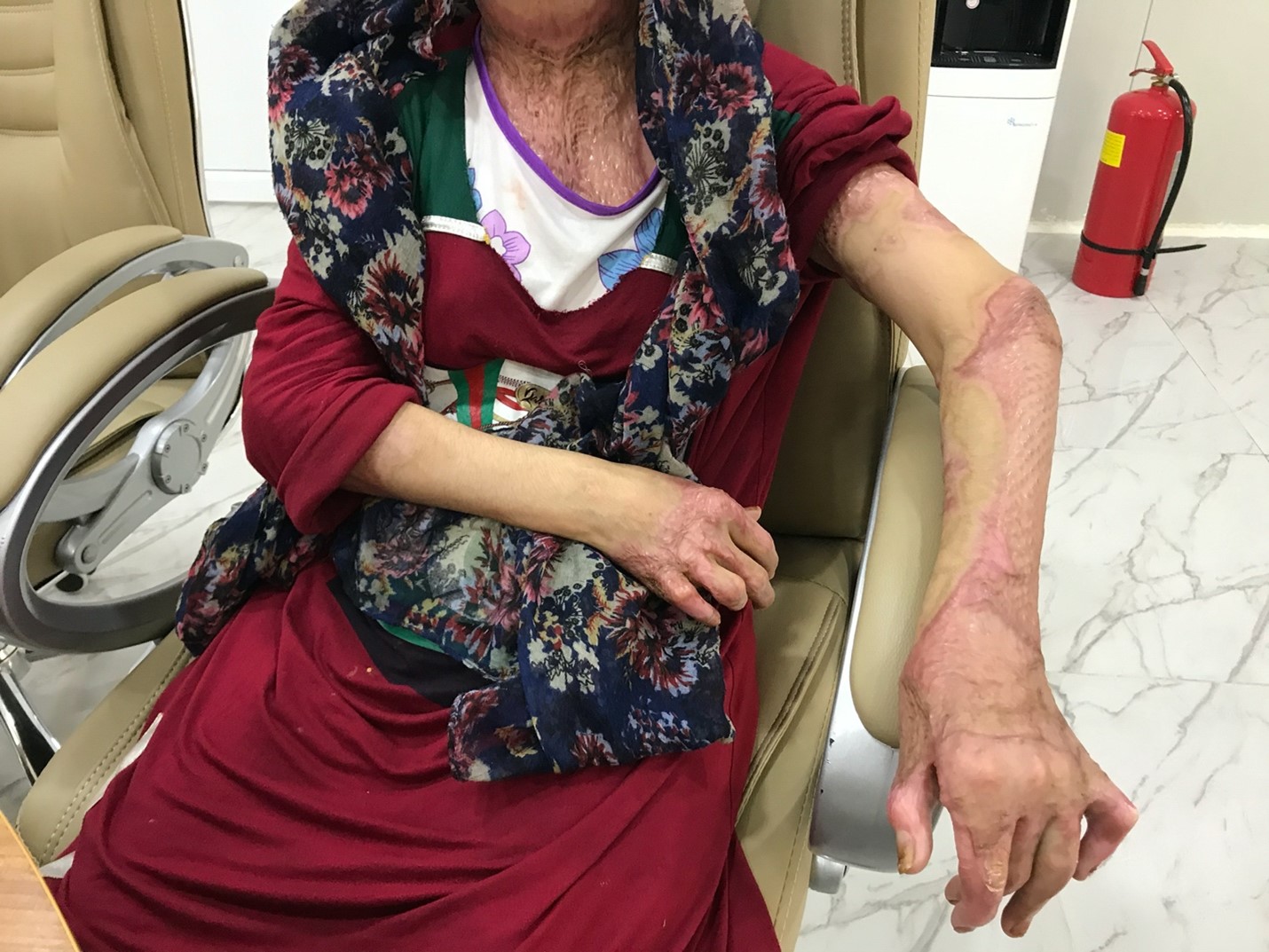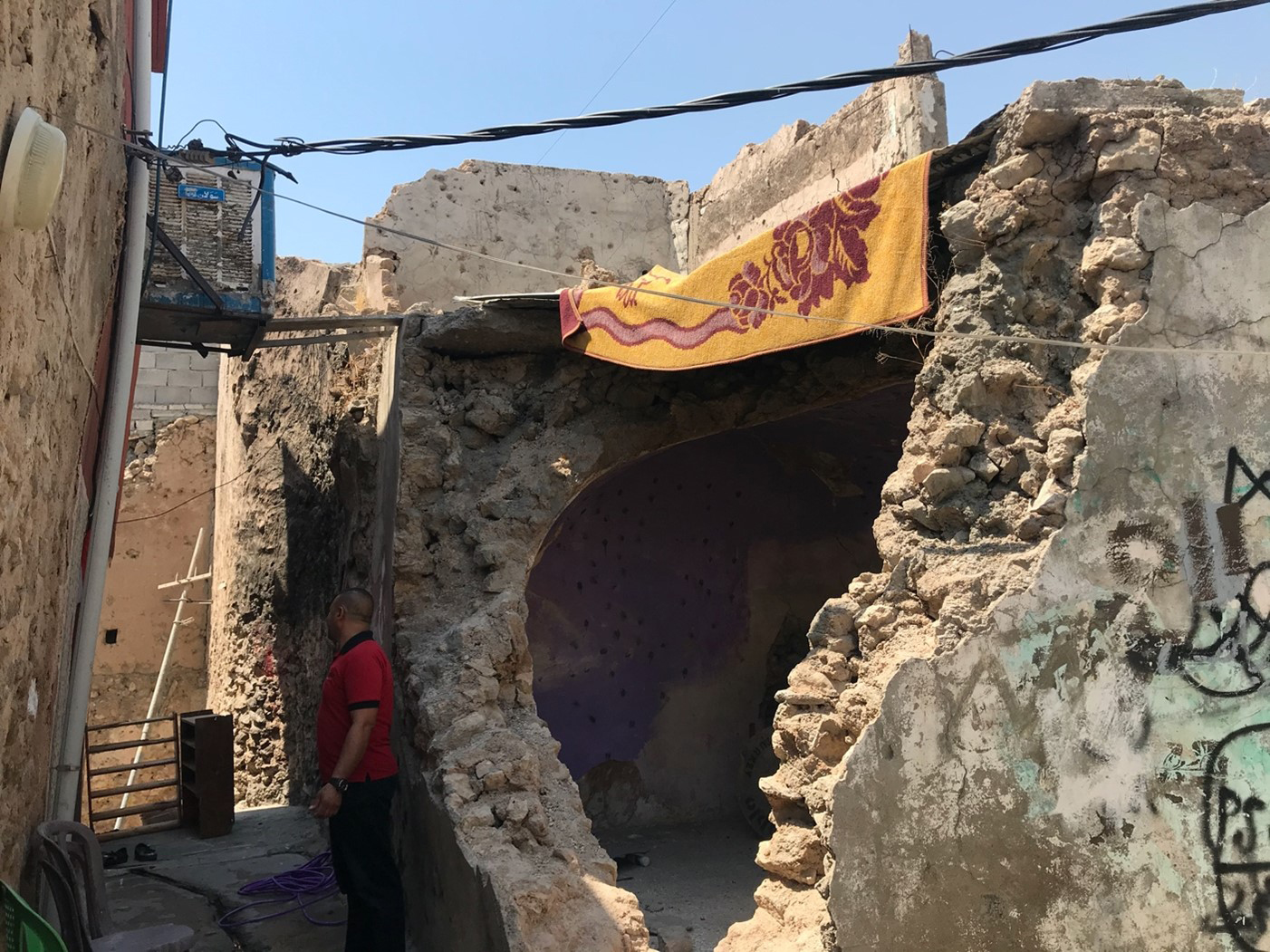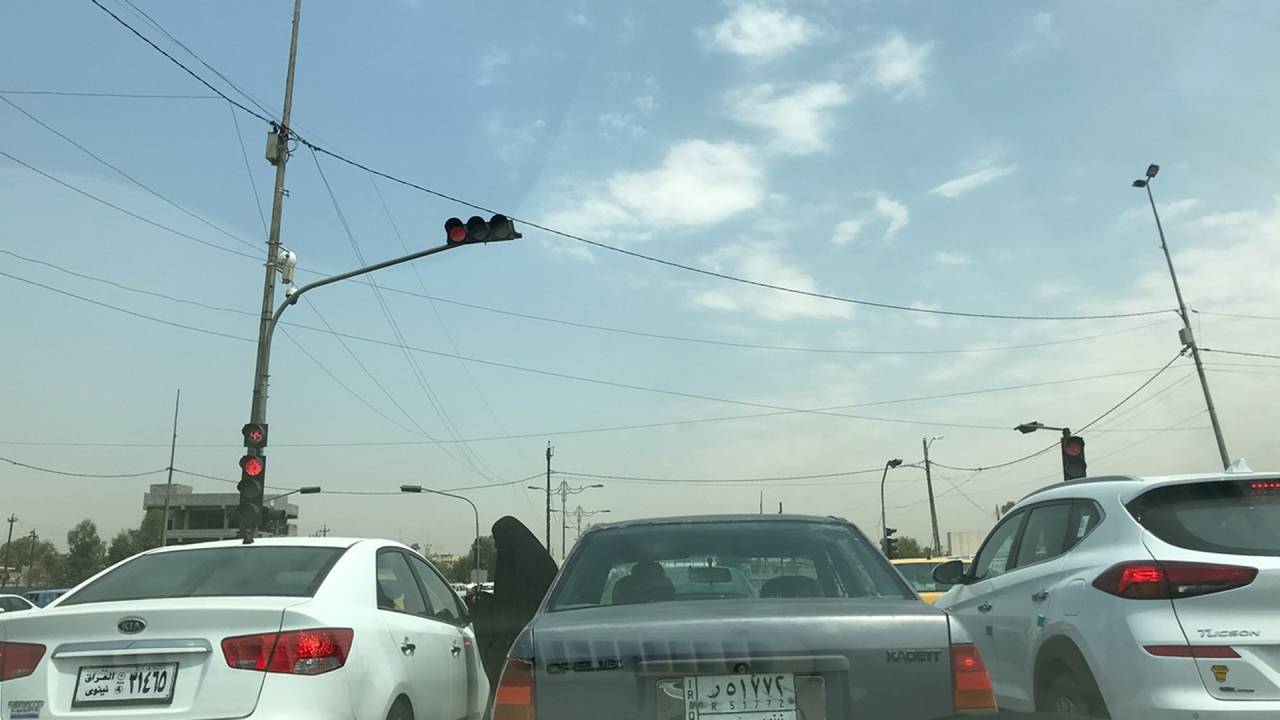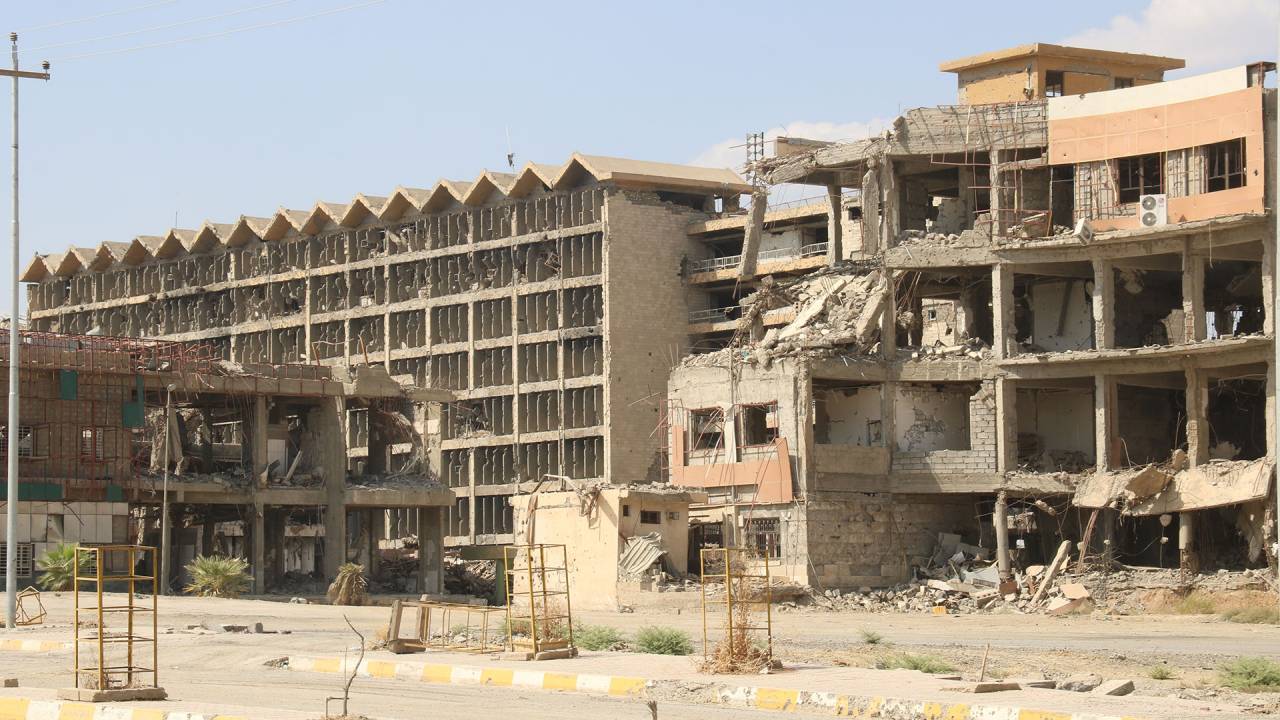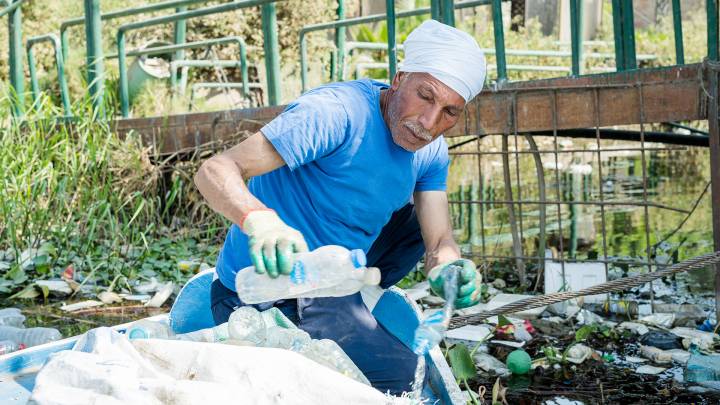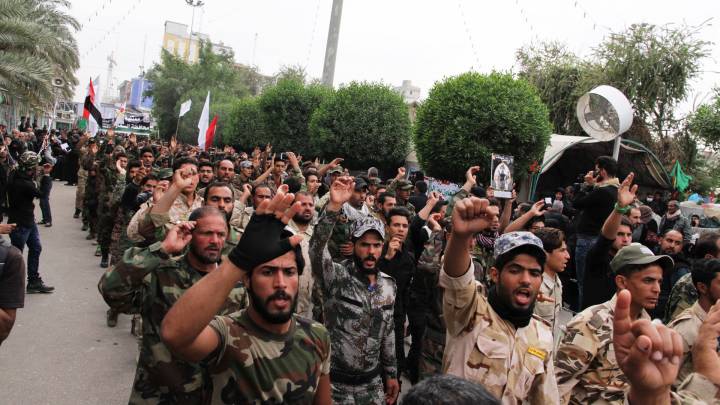Four years after the end of IS rule in Mosul, war trauma, social pressure, and lacking infrastructure push women to the edge. An investigation into what drives female suicides in Iraq’s second biggest city – and how to turn the tide.
Aidan enters the room with her sister, who helps her sit down on a chair. Her frail body occupies only half of it. She has lost a lot of weight over the past six months; her back is arched, and her neck has shrunk to the point that her head almost touches her shoulders. We do not try to guess her age. It is impossible in any case, as her features are completely gone. She tells us she is 34.
Aidan is a housewife and a mother of three. She can read but cannot write. Last June, she poured heating oil on her head and clothes in the bathroom of her parents’ house on the eastern side of Mosul.
We first met her at the Dary Mental Health Centre on the western side of town. She visited it by coincidence that day, as she was heading to a nearby government hospital looking for a plastic surgery service for her burns. Unfortunately, she was unable to find one, as health services in Mosul are very scarce. Government institutions have been destroyed during the four years of military operations to retake the city that was in the hands of the Islamic State (IS) for three years.
We ask her if she was scared or hesitant when she poured boiling oil on herself. “I was shivering in terror, but what was the alternative? I wanted death and an end to all pressures and oppression.”
Aidan has made five suicide attempts over the past 10 years, trying to set herself ablaze or swallow pills, in a bid to escape abuse from her husband and her family’s insistence on divorce. Her husband, who she says runs a bakery and is doing well financially, has been physically and verbally abusing her for years. Her brother has been insisting that she get a divorce and leave him and her children, which she fears the most and refuses.
Her parents argue that she can’t have custody of her children and can’t afford it anyway. Not to mention that living alone with her children in a separate house close to her parents is completely rejected by her clan’s customs, according to her sister. Aidan says her husband beats her because he does not love her, and that her father-in-law interferes in their marriage.
Mosul is the centre of the Nineveh governorate in northern Iraq, some 500 kilometres from Baghdad. The governorate has a population of four million people, nearly half of them women. Mosul is known for its conservative community and its religious and ethnic diversity.
In the last two years there have been several public suicide attempts, with young women and girls throwing themselves from bridges into the Tigris river. Most notably, on 8 August 2019, a young woman jumped from the old bridge and died. The age of female suicide victims ranges between 20 and 50. Their pictures are usually circulated on social media and the women are stigmatised, called infidels or reckless.
Last year, following up on suicides through medical sources and eyewitnesses inside hospitals, as well as social media and local media outlets, we came across three attempted suicides of pregnant women. Two had died by hanging and self-immolation. According to medical sources in the city, domestic abuse and destitution are the most prominent motives for suicide among women.
The most recent public suicide attempt was in August, when a woman set herself on fire in front of the Nineveh Governorate building after waiting at the gate for four hours to submit a complaint. The Governor of Nineveh, Najm al-Jubouri, announced later, “The woman suffered from psychological problems. This was her fourth attempt at suicide.” The story went viral on social media that day, only to be completely forgotten the next day.
‘In 2019, we had 60 suicide cases in three centres only in the city. The victims were women aged between 15 and 60’
According to figures from the Iraqi High Commission for Human Rights (IHCHR), suicides jumped from 22 cases in 2018 to 45 by the end of 2019. Those include 20 women, with some cases unrecorded. According to workers and specialists in psychological support projects and women’s protection and gender-based violence programmes, the figures do not reflect the real extent of the problem.
Ali al-Rassam, the head of six women’s community centres affiliated with al-Mesalla Organisation, which provides psychological support and case management services to battered women, tells us, “Media blackout and failure to show the real numbers of suicide cases in Mosul expose the defect in government performance to this effect.”
He points out the acute shortage of opportunities and services for citizens, especially in healthcare, amid a marked increase in violence against women in the Mosul community and no measures taken to curb this phenomenon.
Regarding the registered cases at some civil organisations that we were able to communicate with, Rassam says, “In 2019, we had 60 suicide cases in three centres only in the city. The victims were women aged between 15 and 60. Some of them had serious cuts and wounds on their bodies. Some of the victims contemplated suicide, some attempted it.”
The families of victims are often reluctant to reveal the causes of their daughters’ deaths, for fear of social shame
Ghada Mohammed (a pseudonym) works as a social researcher in several international women’s protection programmes. “During one whole year, I was responsible for dealing with 30 young women who attempted suicide, two of whom were raped. The cases were distributed between the eastern and western sides of the city,” she says.
The families of victims are often reluctant to reveal the causes of their daughters’ deaths, for fear of social shame. Their deaths are thus often undeclared, or the motives remain hidden in a conservative society. In other cases, suicide is used to cover up the real motive – crimes of sexual harassment and abuse, rape and sexual extortion – something we have discovered during our various interviews.
Mahmoud al-Sabawi, a psychiatrist at Doctors Without Borders, tells us: “Half of the victims who end up seeing doctors or psychotherapists refuse to disclose the fact that they contemplate or have attempted suicide, as suicide is a social stigma. Some women fear that the individuals who prompted them to attempt suicide would be held accountable by the authorities. They keep silent for fear of reprisal by their families or husbands.”
In this vein, according to an official letter from the IHCHR in the editorial file, there were 296 cases of abused women in 2019, and 174 in the first half of 2020. “It should be noted that women often refrain from pressing charges when they are being abused, for social considerations,” Sabawi says.
There is a marked urban, cultural and financial difference between the eastern and western sides of the city, separated by the Tigris. The western side, known as the right coast, is still more than 70 percent destroyed and its inhabitants live in poverty. But both sides do have something in common: the high fences surrounding homes that completely block the view.
Mosul continues to suffer from significant government neglect at the level of basic infrastructure and reconstruction
“If we are to compare the 1970s and 1990s, there was a great difference between the social fabric of Iraqi women and their families. Things started to change with the rise of the religious tide in the region and the start of the Faith Campaign sponsored by the state in 1993,” explains Ayyub Salem, a social researcher. “This changed the form of relations between groups of society, giving rise to the veil and loose clothing for women who started to attend religious classes in mosques amid growing poverty and increased numbers of widows and orphans, as a result of the 1991 Gulf War.”
“During the period of non-statehood and the collapse of the central state system from 2003 onwards, extremist religious groups began to operate in Mosul amid political struggle between the governorate and the Baghdad-based Iraqi central government. There was an uptick in bombing operations, targeting of civilians and military personnel, and destruction of infrastructure.
“This led to the isolation of women in the city, as Mosul was completely cut off from the rest of the Iraqi community. The veil was imposed on women, even non-Muslims, and many women were deprived of education and forced to leave their work, especially following the proliferation of weapons and security chaos until the city fell completely into the hands of ISIS in 2014.”
While extremist groups were eliminated and the Iraqi state had taken back control of Mosul by the end of 2017, “This did not end the isolation of Mosul’s community and its women. The post-war effects, including poverty and psychological traumas, in addition to religious, social and tribal restrictions, are enough reasons for women to commit or contemplate suicide in silence and sometimes out of fear,” he concludes.
Mosul continues to suffer from significant government neglect at the level of basic infrastructure and reconstruction, in addition to rampant bureaucracy inefficiency in light of corruption and political conflicts, resulting in the appointment of three different city governors in the past three years.
We have met 10 women, aged between 17 and 60, most of whom are illiterate. Seven of them have attempted suicide several times, by different means. Two contemplate suicide, and one is planning it. Some of them are over 50 and still being abused, while they look after and provide for their families as their husbands are unemployed and suffer from psychological issues. The husbands of some others have either died naturally or been killed. We have also talked to young victims forced into child marriages or marriages with their cousins according to a tribal tradition called nahwa.
Nisreen, 17, can barely read. She has been married since March and is now pregnant. She has attempted suicide by taking pills just three days before we meet her at the Dary Mental Health Centre in central Mosul. Her husband, a young mason, saved her. Working in construction is no easy feat and requires long hours on-site away from home.
We see him standing frightened and perplexed by the doctor’s office, asking the psychologist why his wife attempted suicide. Three months ago, Nisreen began to feel depressed. She lost her appetite and would sleep for hours during the day.
“Life is scarier than death. I am tired of life. I want to die with the baby inside my belly so I can rest,” she said.
The doctor tells us she is suffering from severe depression for unknown reasons, as she has refused to open up to him. Nisreen, however, tells us briefly that she did not want to marry and that she wanted to stay near her mother. She adds that she regrets attempting suicide, especially after seeing her husband weeping next to her, trying to save her.
We move from the city centre to a slum area, Hayy al-Intisar in eastern Mosul, where we speak to Khaleda (a pseudonym), a woman in her 50s who lives in a mud house. She works as a baker to look after her family, as her husband, whom she was forced to marry, is not working. She has three girls, including her quadriplegic niece.
‘I feel I am less, and not like others’
Khaleda has attempted suicide four times. Her neighbour once stopped her from setting herself on fire. She suffers from severe psychological anxiety and loss of self-confidence. She repeatedly says, “I feel I am less, and not like others.”
Khaleda’s mental health further deteriorated with the death of her daughter and sister during the military operations, and seeing her cousin take her own life in front of her. “She was young and newly married. I saw her burn herself and I could not save her,” she recounts.
Three years ago, during the war and the displacement wave when she was living in a camp in the Kurdistan region, she was taking antidepressants. She has not seen a doctor since her return to the city.
She suffers from nightmares every night and feels she is being watched. She sometimes visits a man she calls al-Sayed (‘the master’), who recites Quranic verses as he presses hard on her eyes. “I still didn’t get any better,” she says.
All the women we talk to have never visited a psychiatrist or a centre for psychological support. They do not even know where such services are provided. Some even refuse the idea altogether because of the social stigma, or out of distrust of doctors.
In a survey on mental health in Iraq, the World Health Organisation (WHO) says 16.5 percent of the population over the age of 15 suffer from mental disorders. The terrorist operations ongoing in Mosul since 2005, ending with the military operation to eliminate IS in 2017, took a heavy toll on the mental health of Iraqis in general, and women in particular.
We meet with a psychiatry consultant who does not want to be named. He was one of three psychiatrists who remained in the city to provide health services during IS control.
“There are no increasing cases of suicide but rather an increase in suicidal behaviour, meaning threatening to commit suicide. This is an impulsive behaviour resulting from social problems and family pressure, and often occurs without prior planning. But it can lead to actual death,” he explains.
He confirms that women are more prone than men to suicidal behaviour, adding that people who threaten to kill themselves can actually commit suicide at any stage or age of their lives.
Service centres and medicines were not available during the three years of IS control, nor during the military operations
Yet some of the people we meet who have attempted suicide suffer from mental illnesses such as anxiety and depression, as a result of despair, insecurity and a lack of vision for the future.
The psychiatrist thus divides the citizens of Mosul who suffer from psychological disorders into two categories.
The first category is those who went through psychological trauma during IS rule, whether generally as part of the city’s community, or individually through severe punishment by the extremist group or losing a family member at its hands. This is in addition to post-traumatic stress disorder as a result of the military operations, especially since fighting was fierce in residential areas.
The second category includes those afflicted with acute psychotic disorder or loss of mental capacity as a result of strong emotion, fear or severe shock without receiving any treatment. Service centres and medicines were not available during the three years of IS control, nor during the military operations.
“Most of the cases in clinics are depression and anxiety, where women are most affected as a result of instability and restrictions on their freedom. This is not to mention that their social options are limited as they are not allowed, as men are, to go out and have social lives,” the expert says.
Some psychiatrists also complain about the lack of mental health hospitals or shelters for people who need long-term medical monitoring or care. “Antidepressants can increase the possibly of suicide during the first weeks they are administered to patients,” he explains.
We notice a similar pattern in the behaviour of the women we meet, despite the great age gap between some of them
We notice a similar pattern in the behaviour of the women we meet, despite the great age gap between some of them. Most of the time, they are very pale and their eyes flicker between the walls and the furniture, avoiding eye contact. They all wear black, with dark headscarves tightly tied.
Noura (a pseudonym), however, is slightly different. She looks shyly at us, and her golden locks are visible under her embellished veil. She is 23, has been married for 18 months, and has an eight-month-old infant. She lives in a slum area known as Hayy al-Tanak (‘tin neighbourhood’) on the western edge of the city.
She has attempted suicide three times, twice by hanging. This prompted her in-laws to make her leave their home. She is married to her cousin, who is two years her junior, and has been unemployed since they got married. He comes from a family that is “very poor”, according to Noura. “He is nice and does not hit me. But I did not choose him. I was told since I was a child that he would be my husband and it happened,” she says as she fiddles with her cheap metal ring.
Destitution is the main reason behind Noura’s suicide attempts. She cannot afford to buy milk for her daughter, who has a wheat allergy. She needs to save $10 a week for this. She has mild depression, causing her to lose her trail of thought. She once tried to kill her child, who was crying from hunger and diarrhoea.
Noura’s brother, who accompanies her to a centre for psychological treatment and is very supportive, tells us, “I contemplated suicide when I learned she tried to kill herself. I fear for her, but I can’t help her financially and this pains me a lot.”
There are only 16 government hospitals with a total of 1,600 beds in Nineveh, for a governorate of nearly four million people
We later contact Noura’s mother. She tells us her daughter’s health is declining, as she has not been eating for a week and has stopped taking her depression medication. Noura’s family does not encourage her to separate from her husband, as this is against their customs.
It is noteworthy that the poverty rate in Nineveh governorate was 37.7 percent in 2020, according to Ministry of Planning statistics.
According to the IHCHR, an estimated 70 percent of health institutions have been destroyed. There are only 16 government hospitals with a total of 1,600 beds in Nineveh, almost the fewest in the country, for a governorate of nearly four million people. According to the Doctors’ Syndicate, there are only 17 psychiatric clinics, with 14 psychiatrists working in government hospitals.
“Psychiatry in general has deteriorated since the mid-1990s, due to the government’s lack of interest in this sector and shortage of staff. The major disaster occurred after 2003, as the wave of change that swept the country was accompanied by overwhelming chaos in the management of health institutions, with a clear tendency to transfer services from Mosul to other cities and areas,” says a psychiatrist talking to us on condition of anonymity.
We visit some hospitals that have changed location, their original building being destroyed. We head to the northern Rashidiya district to visit Ibn Sina Teaching Hospital, which has the city’s largest psychological unit. A large banner says Spinal Cord Diseases Hospital, but this is in fact the new location for Ibn Sina.
We go straight to the psychiatric ward, which is not easy to find given the chaos and disorder inside the hospital. We ask a few doctors and medical staff, who tell us that there isn’t any psychiatric ward, just a room inside the respiratory unit.
We find the right corridor. There are about 10 rooms dedicated to chest and respiratory diseases, and a single room with a sign that reads “Mental Health/Men”. We try to open the locked door; inside are two beds for emergency cases only. We look for a room for women, but there are none; we are told that there aren’t “any rooms for women for the time being. There was one before and it is now used for other purposes”.
We see a man in a dishdasha sleeping on the floor, next to another man wearing trousers and a shirt. Other men in Arab clothing stand in front of a door with a name of an international organisation written on it. This is where we find Dr. Muhammad Salih al-Qaisi.
“In the city of Mosul, there are three mental health centres in three hospitals: Al-Salam Hospital, Ibn Sina Hospital and the Mosul public hospital,” Qaisi, a mental health specialist at the Ibn Sina Teaching Hospital, explains. “The centres’ work is limited to providing external counselling services to patients. There is no psychiatric and neurological hospital or mental health centre in Nineveh for patients who require medium or long-term psychological monitoring and treatment.”
Behavioural psychotherapy through support sessions with psychologists is generally not available in government mental health centres
“We have eight psychiatrists and a consulting clinic for the prescription of drug treatment, in addition to an electric shock device which is no longer used worldwide. We, however, still use it on poor patients who cannot afford the costly drug therapy.”
Patients cannot be admitted to the centres, as they lack food services and care, and psychiatrists rely mainly on drug treatment. Behavioural psychotherapy through support sessions with psychologists is generally not available in government mental health centres. “This division is registered within the Ministry of Health, but on the ground no services are provided to this effect, given the flaws in the health system,” Qaisi says.
We ask whether the small neighbourhood medical dispensaries provide mental health services for citizens or follow a protocol for referring patients to hospitals.
“There are no specialists to follow up on the conditions of patients or to refer them to hospitals. The only doctors present at the medical dispensaries provide obstetrician, vaccination and internal disease services, among others,” he tells us.
Commenting on the availability of medicine for patients, Qaisi said, “Our medicines are very limited and few. We have only six types of medicines for psychosis, depression and psychological anxiety, out of no less than 60 types.”
Temporary centres provide services for women whom they access through workshops on sewing or hairdressing
According to a previous government report, the Ministry of Health provided only 12 percent of essential medicines during 2018. By the end of the year, only six percent were available. According to the WHO, health spending per capita in Iraq is the lowest in the region, estimated at $154 in 2015.
Psychotropic medications are costly, according to Mohammed Sami, a pharmacist. “Iraq receives outdated versions of these medications that do not meet the requirements of use in terms of registration or drug control checks.” A prescription could cost a patient “up to $50, sometimes $300 and more”. Some mental illnesses, such as schizophrenia and bipolar disorder, require taking medication for a long time, sometimes life-long.
Ahmed Hudhaifa, a doctor at the Dary Mental Health Centre, says: “In cases of suicide we adopt drug therapy, as it plays a major role provided that it is accompanied by treatment and psychological support sessions for at least three months. Some patients require sessions for a longer period of time.”
Psychotherapy sessions are not provided in the government sector and are costly in outpatient clinics, at up to $75 for a 40-minute session.
Given the absence of government services for women in the post-IS period, several civil society organisations have tried to make up for the shortfall by providing psychological support services, in addition to gender-based violence programmes. According to a UN plan which we obtained a copy of, there were 78 centres providing these types of services between 2017 and 2019.
These are temporary centres distributed between the city centre and the Nineveh Plain, in addition to camps for the displaced. They provide services for women whom they access through workshops on sewing, hairdressing and other professional courses. They then offer awareness sessions on psychological counselling.
Many workers in the psychological and social support programmes are not selected based on experience in the field of psychology or sociology
Many male and female workers in these psychological and social support programmes are not selected based on experience in the field of psychology or sociology. Therefore, in order to develop the skills of service providers, organisations offer special trainings to deal with mental health cases, including first aid and essential services to determine a specific case, and whether a patient requires a specialist or support sessions with a psychologist.
Regarding the organisations’ plans for mental health projects in Mosul, a psychology consultant who refuses to be named, tells us: “These plans were unprofessional and superficial. According to a financial contract with a doctor, patients are eligible for an examination service once a week without being provided with medicine. These contracts also involved unprofessional staff that are not specialised in dealing with complex mental health cases, including suicide cases.”
“I offered several organisations an action plan to establish reception centres for mental health patients affected by the military operations, with a professional and medically trained staff, in a bid to alleviate disturbances and psychological traumas with constant follow-up. They refused, of course.”
Maha Muhammad (a pseudonym) is an engineering graduate who works as a social researcher with several international organisations. “The services provided are limited and do not cover the needs of women in Mosul. This is not to mention that the response to emergencies is slow,” she explains to us.
She tells us about the suicide of a woman named Zainab, 20, who used to visit the centre. She complained about being sexually exploited and raped by her uncle after her father’s death during the war. Her brother was killed by an unknown person claiming he was loyal to IS. Zainab was also subjected to sexual extortion by officials in government departments.
“I had sent an emergency report on the seriousness of the victim’s psychological and social state, and I had not received any response from the organisation. Two weeks later, I learned that she threw herself off the roof of a building after having set herself ablaze,” Mohammad recounts. She adds that there are many cases similar to that of Zainab, especially in the western areas where many women are homeless, destitute and suffer from depression.
The increase in cases of suicide among women in Mosul should sound the alarm on the situation in the city
Asked if she had received any training during her previous work in the field of psychological support, she says, “When I first started out working in this field, the organisation did not offer me any training, and I was dismissed because I objected to the employees’ negative interaction with battered women. But in my second job, with a different organisation, I received training for five days with someone who was not a specialist in psychological support. I had to rely on lectures and follow up on global health sites to acquire the necessary skills to deal with people with PTSD and suicidal behaviours.”
The increase in cases of suicide among women in Mosul should sound the alarm on the situation in the city. “‘Suicide is forbidden’ [as per Islamic law] is no longer a valid ground for some, especially those who view suicide as a revolutionary act against society and not weakness or surrender,” says Rania, a student at Mosul University whom we meet at a women’s support centre on the eastern side of the city.
As a result of war, many women have become widows and many children (an estimated 23,000) are orphans. This is in addition to the increasing number of homeless and displaced people – 328,212, according to the International Organization for Migration. Yet no strategy for women’s affairs has been developed since the Iraqi state regained control of Mosul four years ago.
The Women’s Empowerment Department in Nineveh, associated with the General Secretariat of the Council of Ministers, is just for show. This new department consists of three female employees and has no budget whatsoever. The current year’s budget has yet to be approved by the Finance Ministry, and the provincial council has been suspended since October 2019, following the decision of parliament to dissolve provincial councils.
In August, a homeless woman was saved after she attempted suicide by setting her tent on fire with her two daughters inside. She has been living on the river bank for nearly a year, surviving on the scraps of food that visitors who sit by the river drinking give her.
‘Mosul is in dire need of an integrated work strategy that includes a centre providing psychological counselling for war trauma’
Rafiah Kabalan, Director of the Women’s Empowerment Department, says the woman is not mentally disturbed but refuses to talk to anyone and is aggressive, attacking anyone who gets near her or her daughters.
“I did not find any place suitable for her. We do not have any hospital for mental health issues or shelters for homeless or battered women. She was sent to a camp for the displaced after an agreement with the Department of Migration and Displacement,” Kabalan says.
Ali al-Rassam, the director of women’s community centres affiliated with al-Mesalla Organisation, says, “Protecting women is the state’s responsibility, which is essential to preventing suicidal thoughts. Organisations cannot provide long-term protection for women, especially those subject to violence. Women face violence at home and in the street amid the government’s negligence. This leaves them with no other choice but to commit suicide.”
He says the centres receive homeless women with children who have critical psychological conditions. “The government does not provide hospitals or shelters for these women. They end up in the streets. Mosul is in dire need of an integrated work strategy that includes a centre providing psychological counselling for war trauma, which should be linked to additional units and departments, including a protection section, gender-based violence prevention departments, a legal department, and human rights and social care units.”
After our long day wandering in the city centre, the sun is about to set in the middle of the Tigris. We have been stuck in heavy traffic for about an hour as vehicles drive cautiously over the Fifth Bridge, still partially destroyed – patched up rather than rebuilt.
The research for this article was supported by the Candid Foundation’s journalism grant.
